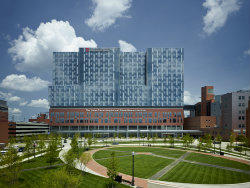
The Ohio State University Comprehensive Cancer Center
Comprehensive Cancer Center
Raphael Pollock, M.D., Ph.D., Director
Columbus, Ohio
Main: (614) 293-5066
NCI designated The Ohio State University as a comprehensive cancer center in 1976. The adult patient care component of the OSUCCC is the Arthur G. James Cancer Hospital and Richard J. Solove Research Institute, which opened in 1990 and was replaced in 2014 by a much larger cancer hospital of the same name. Clinical partners of the OSUCCC – James include The Ohio State University Wexner Medical Center, also on the Ohio State campus, and Nationwide Children’s Hospital in Columbus, Ohio.
The OSUCCC – James’s vision is to create a cancer-free world, one person and one discovery at a time.
Research at the OSUCCC – James
The overarching research priorities of the OSUCCC – James are immuno-oncology, cancer engineering, translational genomics, cancer prevention, and survivorship.
The OSUCCC – James has over 360 researchers who represent 11 of the 15 colleges at Ohio State and at Nationwide Children’s Hospital. Each scientist is in one of five interactive research programs within the comprehensive cancer center:
- Cancer Biology
- Cancer Control
- Leukemia Research
- Molecular Carcinogenesis and Chemoprevention
- Translational Therapeutics
These multidisciplinary teams translate groundbreaking discoveries into innovative patient care via hundreds of clinical trials on the latest therapies, some of which are available nowhere else. The OSUCCC – James is also funded by NCI to conduct phase 1, 2, and 3 clinical trials of novel cancer drugs provided by NCI.
Select Scientific Initiatives at the OSUCCC – James
The Pelotonia Institute for Immuno-Oncology is a comprehensive bench-to-bedside research initiative focused on harnessing the immune system to fight cancer at all levels, from prevention to treatment to survivorship. To guide research efforts, the Pelotonia Institute for Immuno-Oncology is organized into four interconnected centers of excellence:
- Cancer Immuno-Genomics
- Cell Therapy
- Systems Immuno-Oncology
- Translational Immuno-Oncology
These scientists seek a better understanding of cellular systems so they can create more effective immunological tools to fight cancer. Through translational research, they turn discoveries into new or better treatments so more patients can be treated with cellular therapy.
The Center for Cancer Engineering, a collaboration with the Ohio State College of Engineering, enables medical scientists to identify clinical situations in cancer for which engineering solutions are relevant. For example, the university’s electron microscopy unit is developing a program in ultrastructure (cryo-EM). Other engineering applications include a nano delivery system for topical application of drugs (biomechanics), liquid biopsy, molecular imaging, tissue-engineered tumor models, and personalized drug delivery. The Center for Cancer Engineering will also have a Center for Monoclonal Antibodies and Protein Synthesis and will pursue clinical applications in artificial intelligence and machine learning in cancer diagnosis and treatment to enhance precision medicine.
The Enhanced Cancer Prevention, Early Detection, and Treatment Options in Underserved Populations initiative at the OSUCCC – James is being pursued in several ways. Examples include a multi-institutional program project grant led by Electra Paskett, Ph.D., M.S.P.H., associate director for population sciences and community outreach, that is improving uptake of cervical cancer prevention in four Appalachian states (Ohio, West Virginia, Virginia, and Kentucky).
This project is testing the effectiveness of health system–based interventions focused on tobacco use, human papillomavirus vaccination, and cervical cancer screening as part of an integrated clinic-based cervical cancer prevention screening program. Dr. Paskett also directs the OSUCCC – James Center for Cancer Health Equity, which is raising cancer awareness in the community with an emphasis on increasing enrollment in cancer clinical trials, especially by minority participants.
* Information on this cancer center profile was provided by OSUCCC – James.